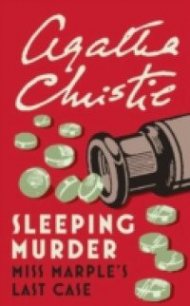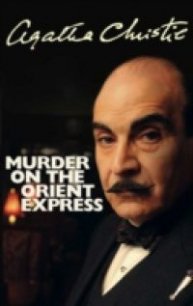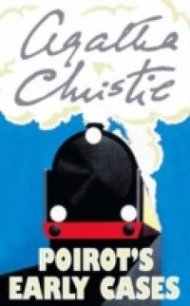The Murder Of Roger Ackroyd - Christie Agatha (читать книги полностью TXT) 📗
Every now and then he shook his head as though not satisfied. Finally, he sat back on his heels.
'Nothing,' he murmured. 'Well, perhaps it was not to be expected. But it would have meant so much ' He broke off, stiffening all over. Then he stretched out his hand to one of the rustic chairs. He detached something from one side of it.
'What is it?' I cried. 'What have you found?' He smiled, unclosing his hand so that I should see what lay in the palm of it. A scrap of stiff white cambric.
I took it from him, looked at it curiously, and then handed it back.
'What do you make of it, eh, my friend?' he asked, eyeing me keenly.
'A scrap torn from a handkerchief,' I suggested, shrugging my shoulders.
He made another dart and picked up a small quill - a goose quill by the look of it.
'And that?' he cried triumphantly. 'What do you make of that?' I only stared.
He slipped the quill into his pocket, and looked again at the scrap of white stuff.
'A fragment of a handkerchief?' he mused. 'Perhaps you are right. But remember this - a good laundry does not starch a handkerchief.' He nodded at me triumphantly, then he put away the scrap carefully in his pocketbook.
Chapter 8. The Goldfish Pond
We walked back to the house together. There was no sign of the inspector. Poirot paused on the terrace and stood with his back to the house, slowly turning his head from side to side.
'Une belle proprietor' he said at last appreciatively. 'Who inherits it?' His words gave me almost a shock. It is an odd thing, but until that moment the question of inheritance had never come into my head. Poirot watched me keenly.
'It is a new idea to you, that,' he said at last. 'You had not thought of it before - eh?' 'No,' I said truthfully. 'I wish I had.' He looked at me again curiously.
'I wonder just what you mean by that,' he said thoughtfully. 'Oh! no,' as I was about to speak. 'Inutile! You would not tell me your real thought.' 'Everyone has something to hide,' I quoted, smiling.
'Exactly.' 'You still believe that?' 'More than ever, my friend. But it is not easy to hide things from Hercule Poirot. He has a knack of finding out.' He descended the steps of the Dutch garden as he spoke.
'Let us walk a little,' he said over his shoulder. The air is pleasant today.' I followed him. He led me down a path to the left enclosed in yew hedges. A walk led down the middle, bordered each side with formal flower beds, and at the end was a round paved recess with a seat and a pond of goldfish.
Instead of pursuing the path to the end, Poirot took another which wound up the side of a wooded slope. In one spot the trees had been cleared away, and a seat had been put.
Sitting there one had a splendid view over the countryside, and one looked right down on the paved recess and the goldfish pond.
'England is very beautiful,' said Poirot, his eyes straying over the prospect. Then he smiled. 'And so are English girls,' he said in a lower voice. 'Hush, my friend, and look at the pretty picture below us.' It was then that I saw Flora. She was moving along the path we had just left and she was humming a little snatch of song. Her step was more dancing than walking, and, in spite of her black dress, there was nothing but joy in her whole attitude. She gave a sudden pirouette on her toes, and her black draperies swung out. At the same time she flung her head back and laughed outright.
As she did so a man stepped out from the trees. It was Hector Blunt.
The girl started. Her expression changed a little.
'How you startled me - I didn't see you.' Blunt said nothing, but stood looking at her for a minute or two in silence.
'What I like about you,' said Flora, with a touch of malice, 'is your cheery conversation.' I fancy that at that Blunt reddened under his tan. His voice, when he spoke, sounded different - it had a curious sort of humility in it.
'Never was much of a fellow for talking. Not even when I was young.' 'That was a very long time ago, I suppose,' said Flora gravely.
I caught the undercurrent of laughter in her voice, but I don't think Blunt did.
'Yes,' he said simply, 'it was.' 'How does it feel to be Methuselah?' asked Flora.
This time the laughter was more apparent, but Blunt was following out an idea of his own.
'Remember the johnny who sold his soul to the devil? In return for being made young again? There's an opera about it.' 'Faust, you mean?' 'That's the beggar. Rum story. Some of us would do it if we could.' 'Anyone would think you were creaking at the joints to hear you talk,' cried Flora, half vexed, half amused.
Blunt said nothing for a minute or two. Then he looked away from Flora into the middle distance and observed to an adjacent tree trunk that it was about time he got back to Africa.
'Are you going on another expedition - shooting things?' 'Expect so. Usually do, you know - shoot things, I mean.' 'You shot that head in the hall, didn't you?' Blunt nodded. Then he jerked out, going rather red as he did so: 'Care for some decent skins any time? If so, I could get 'em for you.' 'Oh! please do,' cried Flora. 'Will you really? You won't forget?' 'I shan't forget,' said Hector Blunt.
He added, in a sudden burst of communicativeness: 'Time I went. I'm no good in this sort of life. Haven't got the manners for it. I'm a rough fellow, no use in society. Never remember the things one's expected to say. Yes, time I went.' 'But you're not going at once,' cried Flora. 'No - not while we're in all this trouble. Oh! please. If you go ' She turned away a little.
'You want me to stay?' asked Blunt.
He spoke deliberately but quite simply.
'We all-' 'I meant you personally,' said Blunt, with directness.
Flora turned slowly back again and met his eyes.
'I want you to stay,' she said, 'if - if that makes any difference.' 'It makes all the difference,' said Blunt.
There was a moment's silence. They sat down on the stone seat by the goldfish pond. It seemed as though neither of them knew quite what to say next.
'It - it's such a lovely morning,' said Flora at last. 'You know, I can't help feeling happy, in spite - in spite of everything. That's awful, I suppose?' 'Quite natural,' said Blunt. 'Never saw your uncle until two years ago, did you? Can't be expected to grieve very much. Much better to have no humbug about it.' 'There's something awfully consoling about you,' said Flora. 'You make things seems so simple.' 'Things are simple as a rule,' said the big-game hunter.
'Not always,' said Flora.
Her voice had lowered itself, and I saw Blunt turn and look at her, bringing his eyes back from (apparently) the coast of Africa to do so. He evidently put his own construction on her change of tone, for he said, after a minute or two, in rather an abrupt manner: 'I say, you know, you mustn't worry. About that young chap, I mean. Inspector's an ass. Everybody knows utterly absurd to think he could have done it. Man from outside. Burglar chap. That's the only possible solution.' Flora turned to look at him.
'You really think so?' 'Don't you?' said Blunt quickly.
'I - oh, yes, of course.' Another silence, and then Flora burst out: 'I'm - I'll tell you why I felt so happy this morning.
However heartless you think me, I'd rather tell you. It's because the lawyer has been - Mr Hammond. He told us about the will. Uncle Roger has left me twenty thousand pounds. Think of it - twenty thousand beautiful pounds.' Blunt looked surprised.
'Does it mean so much to you?' 'Mean much to me? Why, it's everything. Freedom - life - no more scheming and scraping and lying ' 'Lying?' said Blunt, sharply interrupting.
Flora seemed taken aback for a minute.
'You know what I mean,' she said uncertainly. 'Pretending to be thankful for all the nasty cast-off things rich relations give you. Last year's coat and skirts and hats.' 'Don't know much about ladies' clothes; should have said you were always very well turned out.' 'It cost me something, though,' said Flora in a low voice.



